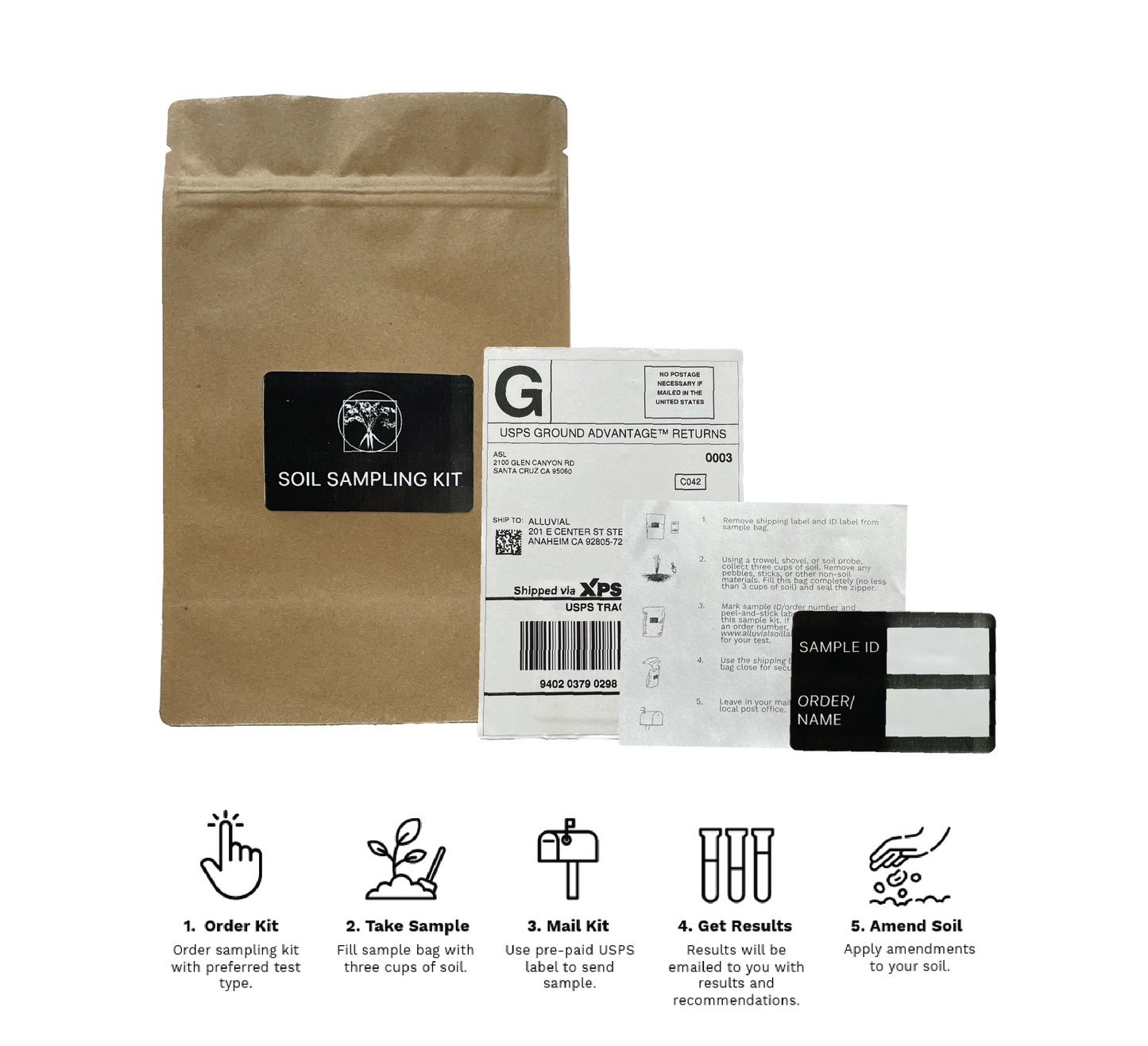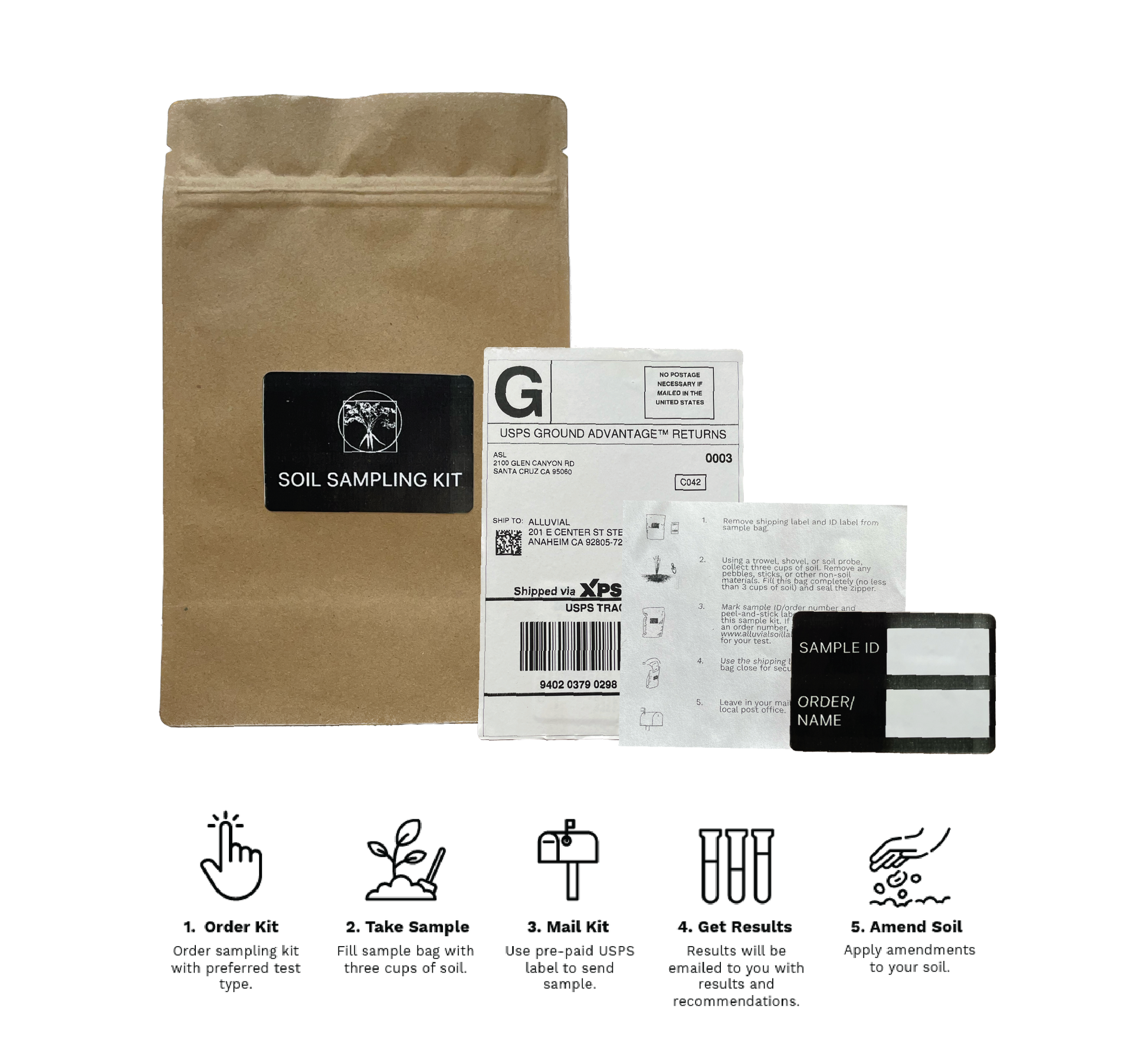Pesticide Screening
Pesticide Screening
The pesticides screening is a critical examination conducted to evaluate the presence and concentration of pesticides in garden soil, focusing on potential risks to plant health. Pesticides, commonly used to manage pests in agriculture, can leave residues in the soil that may affect the growth and well-being of plants. This soil test provides insights into the levels of pesticides present, aiding gardeners and farmers in making informed decisions about pesticide application and soil management practices.
Couldn't load pickup availability
- Fast Turnaround Time
- Accurate Results
- Secure PCI/SSL Payment
- 30-Day Refunds
- Expert Recommendations
- Sustainable Packaging
Report includes:
- Graphs, data analysis, and personalized recommendations with organic or conventional amendments.
- A 15-minute phone consultation with one of our soil scientists.
Residual Effects on Plants:
- Pesticide residues present in garden soil can exert residual effects on plants, influencing their growth and development over time. The persistence of these residues varies depending on factors such as the type of pesticide used, soil composition, and environmental conditions prevalent in the garden.
Effects on Soil Microorganisms:
- Pesticides have the potential to alter the abundance and diversity of soil microorganisms, thereby impacting the delicate balance of the soil ecosystem. Disruption of soil microbial communities can indirectly affect plant health by influencing nutrient cycling and other crucial soil processes necessary for plant growth and vitality.
Pesticide Degradation and Soil Health:
- Understanding the degradation process of pesticides in soil is paramount for assessing their impact on both plant health and overall soil quality. Factors such as temperature and microbial activity play pivotal roles in the degradation process, ultimately determining the longevity of pesticide residues in the soil environment.
Runoff and Plant Exposure:
- Pesticides applied to garden soil can be susceptible to runoff during precipitation events, potentially transporting them to adjacent areas. This runoff can expose plants beyond the initially treated area to pesticide residues, impacting their health by entering their root zones.
Resistant Pests and Plant Vulnerability:
- Prolonged and widespread use of certain pesticides may contribute to the development of pesticide-resistant pests, rendering traditional pest control measures less effective. This phenomenon can increase plant vulnerability to pest damage, highlighting the importance of recognizing and managing resistance to preserve the efficacy of pest control strategies.
Integrated Pest Management Strategies:
- The presence of pesticides in garden soil underscores the importance of adopting integrated pest management (IPM) strategies that prioritize plant health and environmental sustainability. IPM approaches encompass a range of methods, including biological control and crop rotation, aimed at minimizing reliance on chemical pesticides while effectively managing pest populations.
Soil and Plant Compatibility:
- Recognizing the compatibility of pesticides with specific soil types and plant varieties is essential for maintaining plant health and minimizing adverse effects. Some plants may exhibit increased sensitivity to certain pesticides, necessitating careful consideration of these interactions to prevent unintended harm to garden flora.
Sampling instructions
Sampling instructions
Materials Needed
i. Clean plastic bucket
ii. Shovel or soil probe
iii. Plastic bag
iv. Labeling materials (marker, tape, or label)
v. Gloves & mask (for contaminated soils)
Sampling Process
Step 1: Define Sampling Area
i. Identify the specific area for testing.
ii. Collect one composite sample per 1,000 sq. ft.
Step 2: Collect Soil Samples
i. Use a clean bucket and shovel/probe to gather soil from three spots.
ii. Dig 6 inches deep, taking a vertical slice.
iii. Avoid compost piles, pet waste, or fertilized areas.
iv. Do not sample wet soil.
Step 3: Prepare Sample
i. Remove debris, break up clumps, and mix soil thoroughly.
Step 4: Package Sample
i. Measure 3 cups of mixed soil into a resealable plastic bag.
ii. Label with Sample ID, Test Type, and Order Number.
Step 5: Submit Sample
i. Purchase a test on our website.
ii. Mail to Alluvial Soil Lab, 201 E Center St, Ste 112-3083, Anaheim, CA 92805.
iii. Use any postal carrier.
For Soil Sample Kit Users
Step 1: Prepare Kit
i. Remove shipping label, ID tag, and instructions.
Step 2: Collect & Package Sample
i. Follow the standard collection process.
ii. Fill the provided bag completely.
iii. Attach the ID tag and secure the shipping label.
Turnaround and Results
i. Timing depends on test type.
ii. Results emailed with soil composition, nutrients, and recommendations.
Safety Precautions
i. Wear gloves/mask when handling potentially contaminated soil.
ii. Wash hands thoroughly after sampling.
Following these steps ensures accurate soil testing for better gardening decisions.
Advanced details
Advanced details
Aldrin, 4,4-DDE, Alpha-BHC, 4,4-DDT, Beta-BHC, Dieldrin, Gamma-BHC, Endrin, Delta-BHC, Heptachlor, Alpha-Chlordane, Gamma Chlordane, Endrin Aldehyde, Endrin Ketone, Endosulfan I, Endosulfan II, Endosulfan Sulfate, Methoxychlor, Heptachlor Epoxide, 4,4-DDD


Reviews
-

Jack Algiere | Stone Barns Center
Verified Purchase ✓
Alluvial Soil Lab provided us with comprehensive tests for our organic soil based greenhouse. The results were easy to read and will surely be a great tool for anyone looking to better understand their own soils.
-

Wilson H.
Verified Purchase ✓
I recently started a garden at a community plot, and wanted to know what was in my soil, so I could make more targeted amendments. Jake walked me through how to do so, and after sending my samples in... (read more)
-

Noah M.
Verified Purchase ✓
As a professional in the field I very much appreciate the timely and detailed report, along with skilled follow up communications. I will certainly use Alluvial Soil Lab's services again.
-

Zakary S.
Verified Purchase ✓
Great support and detailed report. Helped advise what options we had to plant trees! Plants are doing incredible! (read more)
-

Peggy C.
Verified Purchase ✓
I recently moved to a property with a vineyard, and wanted to know what type of fertilizers to use and how much to apply. So I did a soil test. I was new to soil testing and with Jake's help and instructions, I was able to successfully collect… (read more)
-

Adrian T.
Verified Purchase ✓
Alluvial makes complex scientific lab results accessible and legible for anyone.(read more)
-

Tom R.
Verified Purchase ✓
I wanted to start a vineyard on my land in Alpine, Ca. Unfortunately, it’s mostly clay. I contacted Alluvial and sent a soil sample...received a land rating with nutrient advice...the first test rows thrived, allowing me to plant more this Spring. Thank you! Couldn’t have done it without you. (read more)



